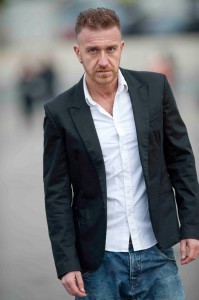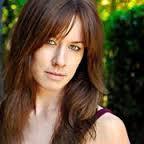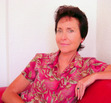Germaine Shames's Blog: Germaine Shames' Blog, page 3
March 5, 2014
Finding the Heart In an Epic Musical
I first met Robert Encila at Studio Connections’ production of A Man of No Importance and knew, instantly and beyond doubt, that he was the ideal director for my musicals, present and future. The gripping performances and spellbinding illusions he brings to the stage can be attributed to one core quality: heart.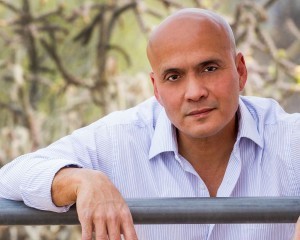
Robert, a member of the Actor’s Equity Association, having directed one hundred productions over the course of twenty-four years, calls himself “a life-long student of the performing arts.” Anyone fortunate enough to have worked with him would say he is a master.
Welcome, Robert! What first attracted you to a life in the performing arts? How did you get your start?
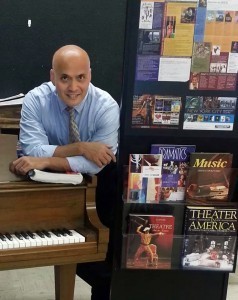 In kindergarten, I was the kid who learned all the children’s songs before everyone else, and the first to volunteer for anything in front of class. At home in the Philippines, my favorite pastime was playing the radio and singing to every pop song of the era. I collected records through elementary school. I loved learning the piano and the guitar. I practiced for hours. I’d grab a hairbrush as my microphone and perform in front of the mirror. My mother had a beautiful singing voice and I found her resonance very soothing. She inspired me more than anyone in my early childhood.
In kindergarten, I was the kid who learned all the children’s songs before everyone else, and the first to volunteer for anything in front of class. At home in the Philippines, my favorite pastime was playing the radio and singing to every pop song of the era. I collected records through elementary school. I loved learning the piano and the guitar. I practiced for hours. I’d grab a hairbrush as my microphone and perform in front of the mirror. My mother had a beautiful singing voice and I found her resonance very soothing. She inspired me more than anyone in my early childhood.
To what do you attribute your special love of Musical Theatre?
Stephen Schwartz’s early material really turned me on. I saw a 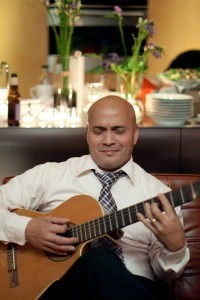 production of Pippin and I was so amazed by it that it set me on a specific career path. In my late teens I played Jesus in community productions of Godspell and Jesus Christ, Superstar. Not long after that I moved to the United States and obtained a full ride to the University of Arizona, majored in music and theater, and later got certified as a theater educator. Looking back, I wouldn’t change a thing.
production of Pippin and I was so amazed by it that it set me on a specific career path. In my late teens I played Jesus in community productions of Godspell and Jesus Christ, Superstar. Not long after that I moved to the United States and obtained a full ride to the University of Arizona, majored in music and theater, and later got certified as a theater educator. Looking back, I wouldn’t change a thing.
Of your many achievements, is there one, or several, of which you feel particularly proud?
Three years ago, I directed a production of America Hurrah by Jean-Claude van Itallie. His writing has always intrigued me because of his seminal work with Joseph Chaikin and the Open Theatre. I thought it was a long shot, but while I was in New York for a gig, I sought him out to see if he might offer some dramaturgical guidance on my production. He actually responded and even invited me to his apartment. Overlooking the East River, over cups of green tea, we re-wrote some scenes together and examined how current local issues might be addressed through re-writes. It was surreal. It was such a creative high!
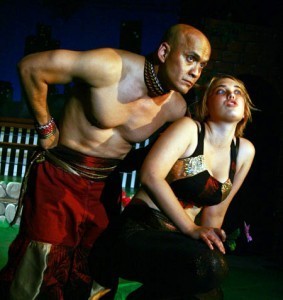 A couple of years before that, I had an opportunity to work with Jude Law in a weeklong psychodrama workshop. We were roommates and became close friends in the process. Psychodrama isn’t about performance, but I can see the gut process as a very useful tool for serious actors. During late-night conversations, I learned a great deal from him about show business, specifically about live theatre versus film work. His insights and experience continue to be a source of inspiration for me.
A couple of years before that, I had an opportunity to work with Jude Law in a weeklong psychodrama workshop. We were roommates and became close friends in the process. Psychodrama isn’t about performance, but I can see the gut process as a very useful tool for serious actors. During late-night conversations, I learned a great deal from him about show business, specifically about live theatre versus film work. His insights and experience continue to be a source of inspiration for me.
Another highlight of my career is performing at the Birdland and BB King’s in New York City with perhaps the greatest musicians you could ever assemble anywhere: the late Benny Powell, Steve Turre, Paquito d’Rivera, Hank Jones, Chico O’Farrill, Candido… the list goes on. Two years ago, I shared the stage with Jon Hendricks, arguably the greatest jazz vocalist/arranger of all time. Best part of the gig was singing a solo in front of Tony Bennett, who was sitting no more than fifteen feet away. Met a lot of fine talents in my life, but performing and being in the same room with my music idols makes me humble to this day.
You have arrived at a stage in your career when you can afford to be selective in choosing 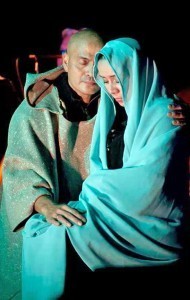 projects. What criteria do you apply in deciding whether or not to take on a new play or musical?
projects. What criteria do you apply in deciding whether or not to take on a new play or musical?
My first criterion has to do with heart. Does it move me in a meaningful way? And the play must disturb me somehow: does it touch a political or social nerve I care about? Is it well written? Is it challenging? That is, is there an opportunity for me to push certain limits so I might grow as an artist? With all due respect, if the material is easy and it doesn’t cause me to sweat a little, what’s the point? I’d rather pull weeds in my backyard.
What was it about You, Fascinating You, the musical, that won you over? What are your hopes for this debut production?
The musical is well written and I like the historical premise of the book. I also love the idea of working with singing ballerinas. This time last year, I had the opportunity to work with dancers from Ballet Tucson in a multimedia production about the life and music of Argentine tango legend, Astor Piazzolla. Working with dancers is a unique experience. So is working with the playwright and the composer on a brand new musical. It’s a rare luxury. This show is ambitious—huge cast, jazz musicians, epic romance. I hope to find the ideal company to deliver the texture I’m envisioning.
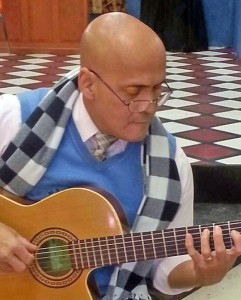 How would you describe the current state of Musical Theatre in the U.S. and elsewhere? Are you hopeful about its future?
How would you describe the current state of Musical Theatre in the U.S. and elsewhere? Are you hopeful about its future?
Standard musicals are fading. There’s a growing trend of hybrid-type musicals, which is good because it reflects the diversity of today’s audiences. Lots of young people are turned-on to musical theater, more so than our generation and before that. As an optimist, I like seeing the variety. In fact, I want more. I want to see more quirky themes and alternative musical genres. There’s room for everyone.
Having said that, I really like the vintage, big-band flavor of You, Fascinating You. That’s the sentimental part of me. It’s like watching a classic piece of noir, except it’s all fresh and new.
What dreams remain to be realized? What is next for Robert Encila?
This seems to be the year for planning travel and for collaborations. I’m also reading more original scripts than I have in recent past, so I’m excited about helping people give birth to their dream projects. What’s next is really about me being open to new challenges and working with other directors, playwrights, and theater companies. I do my best work as a collaborator.
Oh, lest I forget, I’m a dad who enjoys watching his 14 year-old daughter grow up as a performing artist. She seems to be absorbing all this energy. My biggest dream is to see her happy and fulfilled in her passion.
Robert’s Theatre Company, Studio Connections
Robert’s Interview in Broadway World

December 28, 2013
MUSICAL THEATRE ITALIAN-STYLE
 Simone Leonardi, winner of an Italian “Tony,” has big ambitions and the talent and training to realize them. The question is, where?
Simone Leonardi, winner of an Italian “Tony,” has big ambitions and the talent and training to realize them. The question is, where?
Simone studied acting with director John Roman Nardoni before embarking on an apprenticeship in the UK, at the Charioteer Theatre, where he perfected his knowledge of the Shakespearean repertoire. He has studied singing with prestigious teachers Jana Mrazova and Anna Maria Di Marco, and tap-dance and musical repertoire with Ann Amendolagine. He recently directed and starred in the touring musical, The Road to Paradise?
Welcome, Simone!
What first attracted you to a life in the performing arts? How did you get your start?
I was sixteen when I started performing. It began as a pastime. One day a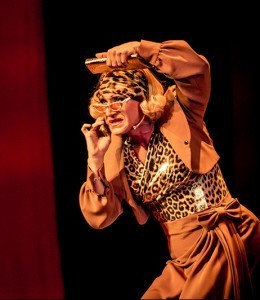 girl at school said, “Would you like to join the theatre workshop? I think you are good enough.” Yes, I must say I was—for a school level.
girl at school said, “Would you like to join the theatre workshop? I think you are good enough.” Yes, I must say I was—for a school level.
The problems started when I decided to become a professional. All the “official academies” of dramatic art I tried to attend refused me. They told me I wasn’t good enough. I decided to continue on my own and started training in song and dance privately with good (and expensive) teachers. Meanwhile I was working in several off-productions in Rome to survive and pay for the lessons.
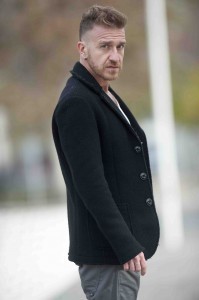 In 2003 a first opportunity came: Promnibus On Stage hired me to be first cast in The Full Monty national tour. And yes, I was one of the six to get undressed! From there my career started. But I kept on studying, especially acting. It’s a never-ending story…
In 2003 a first opportunity came: Promnibus On Stage hired me to be first cast in The Full Monty national tour. And yes, I was one of the six to get undressed! From there my career started. But I kept on studying, especially acting. It’s a never-ending story…
Of your many achievements, is there one, or several, of which you feel particularly proud?
There are two productions I’m very proud I was involved in: Stage 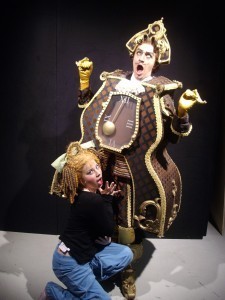 Entertainment’s first show in Italy, Beauty and the Beast, where I was cast as Cogsworth, the clock, and Priscilla, Queen of the Desert, with the role of Bernadette, for which I won the Italian “Tony” (or Massimini Prize).
Entertainment’s first show in Italy, Beauty and the Beast, where I was cast as Cogsworth, the clock, and Priscilla, Queen of the Desert, with the role of Bernadette, for which I won the Italian “Tony” (or Massimini Prize).
If you could play any role, what would it be? And why?
In musical theatre, I wish I could be Bert from Mary Poppins in the near future, and Henry Higgins from My Fair Lady in the next near future. As regards drama, the evil Macbeth would be my first choice. But to speak openly, my aim now is to become a director. I feel that I can’t express myself adequately with a single role. What I need instead is a single show!
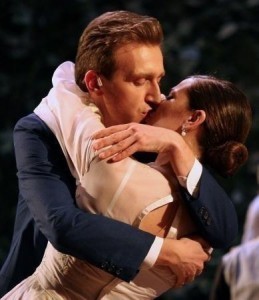 You were kind enough to sing the part of composer Pasquale Frustaci, aka the “Italian Cole Porter,” in the demo recordings of You, Fascinating You. What was it about this musical that first piqued your interest?
You were kind enough to sing the part of composer Pasquale Frustaci, aka the “Italian Cole Porter,” in the demo recordings of You, Fascinating You. What was it about this musical that first piqued your interest?
It was my pleasure. Well, this musical is part of Italian history. American people know how to exploit it better than we do. Plus, I have to say I was impressed by the score. My instinct suggested to me that this would be a good project to become part of. And I did!
How would you describe the current state of Musical Theatre in Italy? Are you hopeful about its future?
Honestly… I’m thinking about emigrating. I have had beautiful 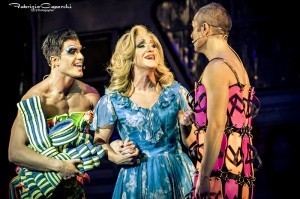
moments in my country. In the past, I could feel I was going somewhere. At the moment, however, we are living in a “dark era,” a sort of modern Middle Age. Nothing happens. Economic crisis, unemployment, corruption… Nobody is investing in theatre anymore, and the few who do are dishonest. You get second-class shows. Performing arts schools are old-fashioned. It doesn’t seem to me that musical theatre—any theatre, actually—is going to have a bright future.
What dreams remain to be realized? What is next for Simone Leonardi?
It is time to reclaim my dreams. I did everything I could do here. I gave everything I could give. And I know I have to search for new inspiration somewhere else. So, what’s next for me? A travel agency, I assume!
To learn more…
Simone Sings “ A Night to Remember” from You, Fascinating You

December 6, 2013
To Dance Giselle!
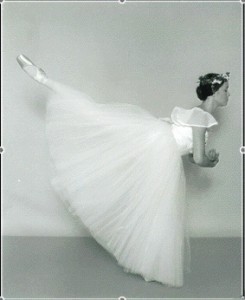
Georgia Preparing to Dance Giselle
Georgia Reed Realizes a Lifelong Dream
I first interviewed Georgia Reed eighteen months ago. My novel You, Fascinating You had just debuted, and Georgia was among the first wave of dancers to endorse it. Like the protagonist of that novel, she possesses an iron will and the inspired tenacity to surmount any obstacle. As in the lives of many ballerinas, injury has come between her and her dream. Yet the dream endures.
Here is the tale in Georgia’s own words…
In 1999, after years of dedication and training, I was chosen to perform the lead role in one of ballet’s most famous stories, Giselle. It was for the 50th Anniversary of my hometown ballet company, Alexandra Ballet. I had just been hired with the Cincinnati Ballet in my first professional position, and I was overjoyed to be able to give back to my community in St. Louis for this special occasion.
Preparing for the role of Giselle, I kept a diary of her thoughts, feelings, and dreams. I came up with specific choices for each dance step, thinking about what motivated Giselle to move in every dance. It was this kind of extra preparation that eventually inspired me to pursue acting, and was the catalyst for who I am today as an actress living and working in Los Angeles in film and television.
However, a few months before the premiere of Giselle in St. Louis, I suffered a terrible injury, and on the night of the performance, I was forced to sit in the audience along with friends, family, and fans – all shocked to see me on the wrong side of the curtain – as I watched another beautiful dancer take my place on the stage.
I never forgave myself for this. And I never gave up on my dream that one day, I might get another chance to perform this 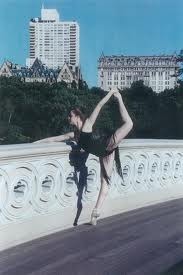 beautiful role.
beautiful role.
Since then I have been given more opportunities to dance on camera and on stage. My strength and confidence have returned. It’s now or never: I have the chance to perform Giselle in 2015 with, once again, my hometown ballet company Alexandra Ballet for their 65th Anniversary. This dream came back to life at the perfect time – I am in the process of creating a documentary about my dance mentor, Alexandra Zaharias – yes, the same Alexandra of my hometown ballet company. She is one of the oldest living American ballet instructors still teaching today.
The beauty of classical ballet is not dead. Miss A’s demand for technique and style created quality dancers and performances that stand the test of time. This is, for me, a chance to give back to my community and to dance, my first great love. The passion I feel for this goes beyond anything I have ever desired to achieve, and I need your help.
Here’s how YOU can get involved:
http://www.indiegogo.com/projects/make-the-lifelong-dream-of-dancing-giselle-come-true

August 19, 2013
Echo Year: Casper Silk Returns With a Hailstorm of Truffles
Shortly after the events of 9/11, author Casper Silk (aka Germaine Shames) and her British partner considered making France a second home and set out to find the quintessential Gallic village. Hate crimes had recently spiked in urban France, but Silk had difficulty
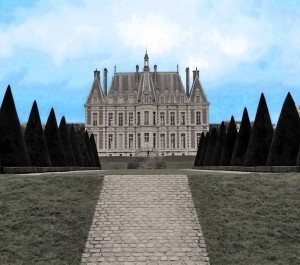 reconciling the headlines with the placid bonhomie that graced the countryside.
reconciling the headlines with the placid bonhomie that graced the countryside.Silk’s forthcoming novel, Echo Year, explores this paradox through the eyes of electronics magnate David Crown who, at midlife, seizes the dream and buys a golden chateau. When Crown finds himself at the scene of a hate crime, his idyll abruptly ends.
With hate crimes endemic to many countries, why did the author focus on France? “France has both the largest Arab and Jewish populations of any country in the EU,” explains Silk, “which makes it a crucible of coexistence on a continent that, historically, has not been particularly hospitable to either group.”
 The author began to research and write the book in late 2001, unwittingly foreshadowing the civil unrest that would erupt in France’s banlieues in 2005 and again in 2007. Says Silk, “In Echo Year a Jewish man reaches out to an Arab teenager living in poverty and hopelessness, and a life-changing friendship develops.”
The author began to research and write the book in late 2001, unwittingly foreshadowing the civil unrest that would erupt in France’s banlieues in 2005 and again in 2007. Says Silk, “In Echo Year a Jewish man reaches out to an Arab teenager living in poverty and hopelessness, and a life-changing friendship develops.”The power of personal connection to heal society is a recurring theme in Silk’s novels. In the case of Echo Year, perpetrator and witness reach across the divide of hatred and discover a deeper affinity.
Francophiles will find plenty to love in this colorful tale of truffle thieves, haunted gargoyles, and the Bastille Day celebration to end all.
Echo Year will be released November 25, 2013. Can’t wait that long? Join our mailing list for a chance to read the book long before it hits Amazon or Barnes and Noble.
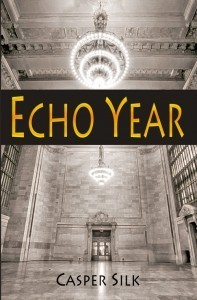 Advance Praise
Advance Praise“In this well-crafted literary novel, the author captures the myriad nuances of a mid-life crisis and brings to life an idyllic village in the French Midi only to haunt it with dark forces. The perfect chateau proves no refuge for protagonist David Crown. Amid a hail of firebombs and truffles, his world comes tumbling down.” David Liss
“Emotive. Sad. Beautiful. Funny. Echo Year is terrific.” Sam Millar, NY Journal of Books
About the Author
Casper Silk is the pseudonym of award-winning novelist Germaine Shames (You, Fascinating You; Between Two Deserts). Silk, author of Hotel Noir, has been compared to such luminaries as F. Scott Fitzgerald, Graham Greene, and early P.D. James “on steroids.”
Reprinted from Selected Fictions

July 25, 2013
Of Love and Music
An Interview with Singer/Songwriter Jasmine Tommaso
Jasmine Tommaso’s singing breaks my heart. Her talent for conveying vulnerability and strength at the same time, and for giving her all every time, makes each song a journey.
Jasmine, the daughter of renowned bassist Giovanni Tommaso, has long had a passion for music and began vocal and piano 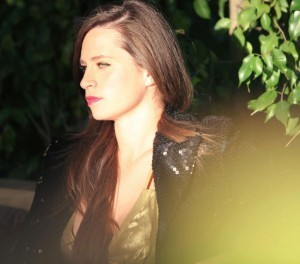 training at a young age with a special appreciation for jazz. She attended the Berklee College of Music on scholarship and went on to perform at important music festivals and in acclaimed venues. A couple years ago she began writing and composing her own music, and today is working on her first album which will be released autumn 2013.
training at a young age with a special appreciation for jazz. She attended the Berklee College of Music on scholarship and went on to perform at important music festivals and in acclaimed venues. A couple years ago she began writing and composing her own music, and today is working on her first album which will be released autumn 2013.
In this interview Jasmine speaks of love and art, and why humanity would be lost without them. Welcome , Jasmine!
How did you “discover” your voice? Have you always known you were a singer?
I was very young when I learned I love to sing. I began studying with a wonderful vocal trainer, Catia di Stefano, in my home town, Mentana, outside of Rome, Italy. Everything took off very quickly from there, but I wasn’t sure what I wanted to be when I grew-up. I simply knew I loved performing.
My mother, Kelly Morris, is an incredible modern dance choreographer. She had her own school at the time and that’s where I spent most of my days. I was surrounded by art; dance and music were my life. I couldn’t think about these art forms as separate entities: One couldn’t exist without the other.
What music did you grow up with? Have your tastes and affinities evolved over time?
 I grew up with a world of different styles of music. Jazz, however, was by far the most present. My father, Giovanni Tommaso, is a wonderful Jazz bassist much appreciated in Italy and the world. I realize now how blessed I was to grow up in such a musical home. Listening to him play each day shaped the person I am.
I grew up with a world of different styles of music. Jazz, however, was by far the most present. My father, Giovanni Tommaso, is a wonderful Jazz bassist much appreciated in Italy and the world. I realize now how blessed I was to grow up in such a musical home. Listening to him play each day shaped the person I am.
I did have a “rebellious” phase in which I strayed from the more sophisticated styles of music and explored the realms of a more commercial pop. I appreciate it very much even today.
Ultimately, I believe my taste is continuously evolving and ever-changing. I found it important to study many different styles of music to help me find my own true voice.
What drew you to musical theatre? How is singing within the context of a story different from singing a pop song?
When I first moved to the United States, I enrolled in the South Orange County School of the Arts. That is where I discovered musical theatre. I already knew I loved to sing and dance, but I hadn’t thought about incorporating acting into these art-forms as well.
It was a true discovery that amplified my love for performing and added a new dimension to my singing. The intensity of my expression became more tangible within the context of a story. I felt compelled to tell and share my character’s experiences with the audience. This somehow made my voice bigger and stronger. I still bring this experience in my singing today.
You will be the living voice of ballerina Margit Wolf on the first recordings of You, Fascinating You, a musical currently in development. What appeals to you about this project? Is there a particular quality in Margit to which you relate?
 It is such an honor and a splendid opportunity to be a part of this incredible project. Not only am I ecstatic to return to musical theatre, I am thrilled to participate in the retelling of a truly moving love story. One that goes beyond all odds.
It is such an honor and a splendid opportunity to be a part of this incredible project. Not only am I ecstatic to return to musical theatre, I am thrilled to participate in the retelling of a truly moving love story. One that goes beyond all odds.
I connected with this project immediately. The book ties-in with my country of origin, Italy, and is filled with a palpable density of art, love, hardship, travel and perseverance.
The strength of Margit’s character is what I most relate to. Love and art are the two most important things in this world; without them I’d be lost. We’d all be lost.
You have a smashing new album about to debut. What can you tell us about it?
Thank you! Yes! The title of my debut album is “Listening Party!” It’s a collection of rearranged cover songs from the 20s through the 70s and also contains a few original songs.
This project began when I was working in a chocolate shop in West Los Angeles about a year ago. My current producer, Marvin Etzioni, came in to enjoy a chocolate waffle and the rest is history…
It’s a record that encompasses my first year of experiences here in Los Angeles, a year of transformation, growth, hardships, disappointment, excitement, wonder, music, love, and unlikely coincidences. Completing this record has been an incredible journey. I have met and lost new friends along the way, and I’ve learned to appreciate and value time.
“Listening Party!” is also a record about acceptance and the art of “letting go.” We cannot foresee the extent to which a single experience can gift us; it may be much greater than anything we could ever imagine. For this I have learned to simply do my best while keeping a light heart. Music will take me where I need to be.
What is next for Jasmine Tommaso? What dreams have you yet to realize?
 What’s next? Who knows! I have many projects I’d like to see through. I’m looking forward to returning to Italy in September to promote my new album and to perform in my home country. And then perhaps explore the musical scene in Europe a bit.
What’s next? Who knows! I have many projects I’d like to see through. I’m looking forward to returning to Italy in September to promote my new album and to perform in my home country. And then perhaps explore the musical scene in Europe a bit.
I also would love to do more work for music in films. I had the opportunity to step into that realm a little here in Los Angeles and found it incredibly fascinating.
My dreams are certainly music-filled! I’m not quite sure what the future holds, but I’m very excited and motivated to continue writing and singing. And for the rest, as I always say, “We’ll see how it unfolds.”
To learn more:
Jasmine’s Songs on Reverbnation

May 18, 2013
Finding the Music in An Epic Story
You, Fascinating You, a novel based on the epic story behind a timeless love song, will soon come full circle on the stage as a dramatic musical. I returned to my roots in Theater to write the book and lyrics. Because music resides at the very heart of this story, I knew that I needed to attract an exceptional composer.
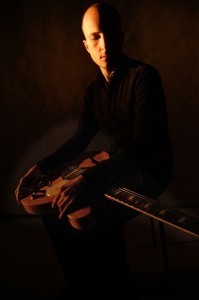 I found Federico Ferrandina on Stage 32, a global network of working artists, and was struck by the elegance and timelessness of his compositions, and by how they subtly echoed elements of the music that was so much a part of my protagonists’ lives.
I found Federico Ferrandina on Stage 32, a global network of working artists, and was struck by the elegance and timelessness of his compositions, and by how they subtly echoed elements of the music that was so much a part of my protagonists’ lives.
Federico earned degrees in Classical Guitar and Composition before branching into film scoring, his current specialty. His songs and orchestral pieces grace film and television soundtracks in Italy, the United States, Canada and Poland. In October 2012, he won two Global Music Awards for his pop song “What We Are” and the instrumental “Paradigma.”
In the following interview, he shares his love of music and story.
—What first drew you to a life in music?
I was born in a family of musicians. My mother was a piano teacher, my grandmother a violinist, and my great grandfather the conductor of a military band, as far as I know, but maybe this is not an exhaustive answer. I mean that the exposure to musical stimulation since my tender age had probably brought a particular propensity to music, but I think I started feeling music as my main expressive horizon when I was about 11 years old, completely bored by classical piano lessons, and I discovered the Beatles and the whole rock culture that taught me what is a musical emotion. I know that’s a paradox, but only after this did I learn the real deepness of so-called classical music that I was obliged to study since I was a child. Maybe I had to reach it my own way (some say that growth presupposes transgression…).
—You divide your time between Rome, Italy and Los Angeles, California. How does this double life influence your music, and what career opportunities does it afford you?
My frequent travels and stays in California started just after the achievement of the Global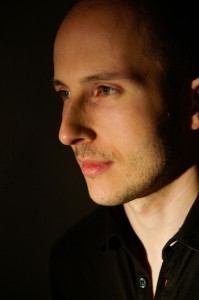 Music Awards. It’s a quite new thing for me, so it’s hard to say, but in L.A. I had the chance to meet and work with colleagues from the film music industry that influenced a lot my musical thoughts. My practical methods of writing are changing too, not to mention the wonderful and inspirational independent musical scene of Los Angeles, swelling with new ideas and sounds that immediately captured my curiosity.
Music Awards. It’s a quite new thing for me, so it’s hard to say, but in L.A. I had the chance to meet and work with colleagues from the film music industry that influenced a lot my musical thoughts. My practical methods of writing are changing too, not to mention the wonderful and inspirational independent musical scene of Los Angeles, swelling with new ideas and sounds that immediately captured my curiosity.
—You have won awards both in Italy and globally, produced CDs, placed songs in film and television… Which achievements as a musician and composer give you the most satisfaction?
They’re all tiles of the same mosaic. I get some sort of satisfaction when I know that my music has been able to share my emotional message with someone; it happens in different ways and circumstances. You Fascinating You, the musical, is a good example.
—What drew you to You, Fascinating You?
I was contacted directly by writer Germaine Shames, who found my music on the Web and asked me to work with her on this musical. I accepted almost immediately. This story speaks to me in such a deep way, and I love everything that deals with ballet and dance, a passion of mine.
—This musical tells the story behind the timeless Italian love song “Tu solamente tu” by Neapolitan composer Pasquale Frustaci. How would you describe Frustaci’s music? Does it bear any resemblance to your own?
Pasquale Frustaci is known, above all, as a songwriter. We can consider his songs as pop songs of that age, with clear references to Neapolitan folk melodies, but they immediately reveal a deep knowledge of late Romantic music in the harmonic movements and a smooth influence from jazz (Gershwin, Cole Porter, Berlin…) with rhythmic elements from Latin American music (Tango and Beguine). These same features coming from both classical and jazz music that converge into a Mediterranean conception of melody belong to my music, too. I’m always searching for my own way to make these soundscapes dialogue.
—What are you finding most challenging about composing the score of You, Fascinating You?
 I want to create a sound horizon that evokes early 20th century music (pop and classical) yet is able to speak to contemporary audiences. The challenge is to experience music from a past age by way of a contemporary sensibility. It must engage the irrational and unconscious part of the audience and drive them to the heart of You, Fascinating You.
I want to create a sound horizon that evokes early 20th century music (pop and classical) yet is able to speak to contemporary audiences. The challenge is to experience music from a past age by way of a contemporary sensibility. It must engage the irrational and unconscious part of the audience and drive them to the heart of You, Fascinating You.
—What are your hopes for this project?
I hope that this history reaches people and touches their intimate feelings. You, Fascinating You is a chance to reflect on our past and mistakes, on our dreams and love.
Visit Federico’s Website
Federico on
View Federico’s YouTube Channel
Hear Federico’s Music on SoundCloud
Hear THE SONG that started it all!

April 21, 2013
Dance and Aging
“Dance, dance, or we are lost!” Pina Bausch
In the highly competitive and youth-dominated world of professional dance, most performers retire in their thirties and early forties. For a dancer whose very identity is bound up in performance, what more does a life in dance have to offer?
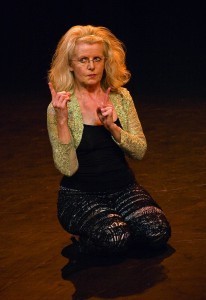 The following interview with dance educator, writer and choreographer, Linda Ashley, explores both the challenges and opportunities faced by the aging dancer. Welcome, Linda!
The following interview with dance educator, writer and choreographer, Linda Ashley, explores both the challenges and opportunities faced by the aging dancer. Welcome, Linda!Why did you feel a need to coin the term “Youthanasia,” and what exactly do you mean by it?
I haven’t coined a dictionary definition for the term. However, if I were to do so, it would hover around something to do with the historical stereotyping of dance as a youth-driven art form combined with the more recent growing awareness of how dance can contribute to the quality of life for all ages.
At the time I began using the term Youthanasia, I was intrigued by two important factors. First, the students I was teaching on the Bachelor of Dance seemed to have little idea of what they would do in their careers as they aged and saw dance only through a performer’s eyes. Second, I was concerned about the rise of TV shows that seemed to focus on dance as a young people’s art form and little else.
Can a dancer avoid, fend off or battle Youthanasia? What approach to longterm career and life planning would you advise for young people who have a passion for performance?
I don’t think Youthanasia is avoidable per se. If I had to choose one piece of advice for young dancers, it is to take a 360-degree view of dance in the world that includes, but is not restricted by, performance.
For young people who are driven by the image of dance as performance, I
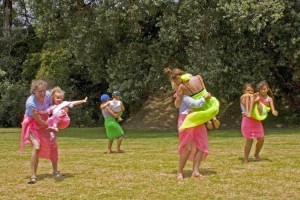 would suggest first-up doing a university dance degree, if they are inclined that way at all, because studying dance is what prepares and gives one diverse capabilities. Also, the study is the theory and the practice combined. I always tried to teach this way. My books are written from the same perspective, and it was how I was educated in dance.
would suggest first-up doing a university dance degree, if they are inclined that way at all, because studying dance is what prepares and gives one diverse capabilities. Also, the study is the theory and the practice combined. I always tried to teach this way. My books are written from the same perspective, and it was how I was educated in dance.
As a student comes to understand what a vital role dance can play in improving the quality of life for many, many different people, his or her career path can be clearer and elongated, so that one doesn’t necessarily have to give up dance later in life but can still earn a living from it. One may even still be able to perform like I, and many others, do at age sixty and beyond.
The enormous value of a dance education and/or training is that it is a massively disciplined and challenging way to live and learn. It is also one of the things that can prepare dancers to make their way in the world of work. Dancers can do anything!
Addressing the topic more personally and taking emotions into account, can you recall a moment or turning point in your own performance career when your aging body let you know its limitations? What did that feel like and how did you cope?
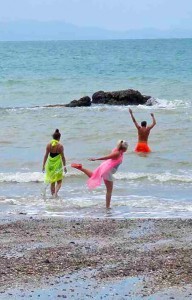 Perhaps an excerpt from my solo dance monologue might be helpful here. It captures a conversation that I have with my alter ego Dolly Mixture:
Perhaps an excerpt from my solo dance monologue might be helpful here. It captures a conversation that I have with my alter ego Dolly Mixture:Dolly (rather pointedly): “You’ve peaked!”
Linda (in disarray and panic): “When did that happen?”
Dolly: “Just when you start to realize how to do it, your body packs up.”
Linda (in massive panic): “Why didn’t anyone tell me?”
Perhaps this captures how injuries become ongoing niggles and muscle power diminishes gradually, making how and what an older dancer can perform an ongoing negotiation with the body.
From time to time, one receives vivid reminders of how one’s performing capabilities have changed. Recently, for example, I performed with dancers who were half my age and really felt the differences between their dancing and mine. We bring different qualities to performances; I brought my wealth of administrative, choreographic and performing experience. It’s not all about performing! Above is a photo of one of my better moments (I’m in pink).
We have heard critics deride such dancers as Margot Fonteyn for retiring too late, or Darcy Bussell too soon. Is there ever a right time to retire?
Good question. I guess it depends on what kind of dance you are retiring from and to. Classical ballet is most challenging for older dancers in its physical demands. However, leading classical dancer Mikhail Baryshnikov made a shift to postmodern dance in 1989 and critics recognized it as a success. In 2001, critics acknowledged that his physical intelligence was still as mesmerizing as his youthful performances once were.
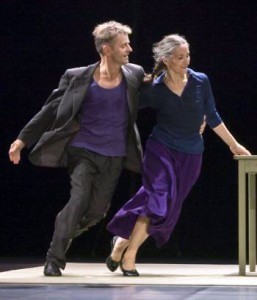
Personally, I even think that there may be room for ballet dancers to perform ballet but with a different emphasis in later life. In my book Essential Guide to Dance, I write “It is this deepest physical integrity of a dancer in performance which offers dance today a future of great promise and excitement.” I truly believe this, and the future for older dancers is only just beginning.
What is next for Linda Ashley? Is there life after Youthanasia?
What’s next is to keep up with some sort of active dancing and choreography. I still occasionally receive invitations to perform Youthanasia of Dance, and I like doing this, because people have fun and it provokes lots of interesting discussion. Also, I hope to work on some more beach dance projects for community and professional dancers to participate in.
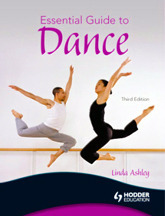 I am keeping up with my writing and conference presentations. Recently, I’ve been peer reviewing for a couple of academic journals, too. I have ideas for three more books that have been floating around in my mind for several years, and one of them is currently in the pipeline and nearly ready to go looking for a publisher.
I am keeping up with my writing and conference presentations. Recently, I’ve been peer reviewing for a couple of academic journals, too. I have ideas for three more books that have been floating around in my mind for several years, and one of them is currently in the pipeline and nearly ready to go looking for a publisher.Oh, and I’m still gardening and working on being a connoisseur of the mundane. I can highly recommend that; it’s underrated.
A Meditation on Dancing and Aging by Martin Keogh

January 21, 2013
Mystery Revealed: Author Casper Silk Unmasks
Silk and Subterfuge…
For the past several years I have been dancing with a shady male alter ego, channeling his dark visions and lofty ideals into novels, and hiding my double identity from all but a few close friends. In short, dear reader, I am the mind and soul behind the mysterious Casper Silk, author of Hotel Noir.
How did Casper Silk come into being? At the end of the ‘90s my brother, author Laurence Shames, encouraged me to write a novel set in a hotel—sound advice, given my background as a roving junior exec for Hilton International. A first draft of Hotel Noir began innocently, even playfully, but soon took an ominous turn. Alongside the fussy frivolity of resort living spawned a Doomsday cult worshipping my sainted namesake, Germaine.
From that point on, the novel ceased to resemble anything I had written in the past. Though literary, it leaned toward genre; though dealing with intimate and emotional themes, the writing had a bracing “masculinity” about it.
My then publisher, McAdam/Cage, had first option on Hotel Noir. An editor there rejected the book, saying that he had expected a female protagonist and implying that I had breached some unwritten literary rule of gender jurisdiction.
A decade would pass before the novel was finally published.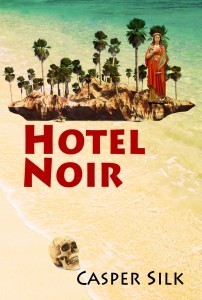
Then things got interesting. Critics began comparing Casper Silk to such immortals as F. Scott Fitzgerald, Graham Greene, P.D. James “on steroids,” Thomas Mann and J. G. Ballard. These references imbued Hotel Noir’s reviews with a sort of reverence. No one questioned Silk’s gender. My directly authored works, in contrast, though consistently well reviewed, have never drawn comparisons to male authors of renown—or to any male author, for that matter.
It feels so good to be Casper Silk, in fact, that I hesitate to unmask. For the first time since beginning to write nearly three decades ago, I feel fully valued as an author.
I don’t profess to understand why gender apartheid persists in the 21st century. That it does is disheartening. For as long as it does, however, pseudonymous doubles like Casper Silk will find a way into the literary mainstream through some crafty combination of talent and subterfuge.
I, Germaine Shames, look forward to the day when talent will be enough.
Praise for Hotel Noir
“A noirish combination of F. Scott Fitzgerald and early P. D. James on steroids, as told by a narrator who knows how to weave a web and pull you in without your realizing that you are caught. An intriguing literary crime novel filled with wonderfully zany characters Agatha Christie would have killed for.” Sam Millar, NY Journal of Books
“I was not far into the book when I drew the comparison of Hotel Noir to Death in Venice.” Charlie Courtland, aka Archie Standwood
“Compellingly readable throughout… the whole book is a delight.” Jack Chapman, author of Watching Marilyn
“I’m thoroughly intrigued by this novel, though not necessarily for straightforward reasons. I think what has hooked me is that it doesn’t seem like anything else. Casper Silk has a wholly unique voice. It’s an entirely bizarre one, too, and Hotel Noir is a dark yet evocative portrait of an island quickly changing, a hotel of another era, and a man caught in the midst.” Lexy Bloom
View on YouTube.
Download a free excerpt of Hotel Noir.
Read a review of Hotel Noir.
Hotel Noir can be purchased at Pale Fire Press and worldwide at most major online book retailers.

December 18, 2012
2012
Year’s end has become a time of lists—top news events, best books, memorable quotes… Having lived 2012 at full tilt with my sights on the horizon, I’ve kept no list, but my writings—both on this blog and elsewhere—
suggest what has mattered to me and who has shared my journey.
You, Fascinating You, a dance and music-themed novel, debuted earlier this year and went on to be named “Editor’s Choice” by the Historical Novel Society. With its publication, ballet became a focal point of my life and I was privileged to get to know dozens of dancers, some of the most disciplined, dedicated and generous people I have ever encountered.
A year ago, no one had heard of my ballerina heroine Margit Wolf; today her story has reached audiences across the globe from South Africa to New Zealand, from Germany to China. Caring colleagues and readers of every nationality and walk of life have made this possible.
Musicians, too, have entered my sphere in record numbers, enabling me to realize my lifelong dream of becoming a lyricist and songwriter. Hearing my words wed to a melody and performed is a thrill like no other.
Now for a confession: I’ve been leading a double life this past year, writing both under my own name and a nom de plume. This visceral shift of perspective has allowed me the freedom to explore new literary frontiers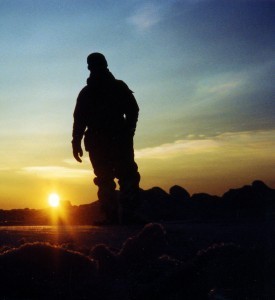 and untapped veins of inspiration, and to reach out to readers beyond my established niche. Critics love this darker and more daring alter ego; I hope you will, too. Please check back in the New Year, when all will be revealed.
and untapped veins of inspiration, and to reach out to readers beyond my established niche. Critics love this darker and more daring alter ego; I hope you will, too. Please check back in the New Year, when all will be revealed.
What vast, rich and mysterious worlds have opened to me in 2012! How grateful I am for your company. May we grow in wisdom and, together, realize our noblest dreams.

December 8, 2012
The Anthropology of Serendipity
Dr. Peter Cleave on Avoiding the Hamster Trap
Dr. Peter Cleave has one of those storybook CVs that reads like Gulliver’s Travels, epic adventure of a restless mind. An accomplished anthropologist, Rhodes Scholar and Oxford Ph.D., an iconoclast and risk-taker, Peter has eked out a unique niche in the Performing Arts as a musician, playwright and essayist. A New Zealander by birth, he has been active in the Maori community for decades and has emerged a well-known personality on Maori radio.
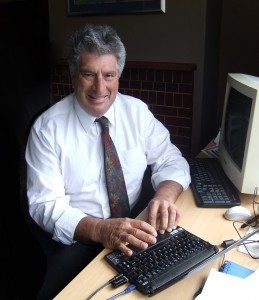 By any measure, Peter’s life and career have taken some unexpected, and even serendipitous, turns. In the following conversation, he takes us along on that journey. Welcome, Peter!
By any measure, Peter’s life and career have taken some unexpected, and even serendipitous, turns. In the following conversation, he takes us along on that journey. Welcome, Peter!
What drew the young Peter Cleave to the field of Anthropology?
I did a funny kind of undergraduate degree in Anthropology. Funny because I was not at University half the time. I was working on banana boats and generally being a late Sixties type of teenager. I did like the idea of studying people from other cultures, but Anthropology was not a big deal for me, merely something that I did to get a degree.
I liked scrub cutting on Waiheke Island near Auckland, working on the boats, hitchhiking around the country and having fun with my mates. And I liked art, particularly talking about art. I managed the front of the house at the Mercury Theater in my last year of the degree and that was an all-night talk-about-art thing to do for me at that time.
The degree in Anthropology happened. Occasionally I went to lectures. Having staggered through my Bachelors I ran a theater group for a bit, wrote songs and plays, and then drifted into teaching and thought I’d do a Masters. My major having been in Anthropology, that was my only option. It might well otherwise have been in Linguistics or Literature or something else, as I did not really have a burning passion for Anthropology at that stage.
Some anthropologists are passionate about the discipline. They love marking theses, dealing with students and enjoying the circumstances of who is working where and what they are doing. I’m not really into that. I like working in the field. For many years I have worked for Maori iwi or tribes and in the last few years that has become more specific as I have been employed to speak Maori on a tribal radio station.
At the same time I write a lot and always have. So my passion is in those areas, the field and the writing.
How impressive that you attended Oxford as a Rhodes scholar. What effect did that sojourn have on your worldview and the subsequent course of your career?
While lecturing at Waikato I sent an application to Oxford with my photograph and a chapter or so of my thesis and to my astonishment I got accepted.
And then I went to Oxford and had to get serious about Anthropology as Oxford and Cambridge, from a certain point of view, are the homes of the subject. At that time—and still, knowing Oxford—the hard bit was getting through the hoops. There was a highly competitive system, to put it mildly, where you did a probationary Bachelor period, a probationary Masters period and then you got permission to do a Doctorate, which you then submitted. Each stage took a couple of semesters. The minimum time to get through the hoops was two years and this I did.
I played a lot of guitar in England mainly at my College but also a bit of performance work in pubs.
As I proceeded through the hoops at Oxford, I applied for funds from the Rhodes Foundation and got them. So in my case I went to Oxford and then became a person in receipt of Rhodes money, rather than becoming a Rhodes Scholar before going.
Oxford was kind to me. I was the Chairperson of my Common Room, captained a sports team and did a Doctorate. It was a great time.
At the same time, it may be that I took something to Oxford from the bush in New Zealand or from the experience on banana boats. One way to think about people who come out of Oxford might be to look at their backgrounds and search out how they think. In my case, I owe a lot to my grandparents, especially the late Peter Mataga. I went to live with them at a early age when my mother died. How my grandfather thought as a second-language speaker of English, coming originally from the Neretva Valley on the Adriatic, was with long reflective silences in situations where a voice was never raised. That style worked for me at Oxford.
Zealand or from the experience on banana boats. One way to think about people who come out of Oxford might be to look at their backgrounds and search out how they think. In my case, I owe a lot to my grandparents, especially the late Peter Mataga. I went to live with them at a early age when my mother died. How my grandfather thought as a second-language speaker of English, coming originally from the Neretva Valley on the Adriatic, was with long reflective silences in situations where a voice was never raised. That style worked for me at Oxford.
The other edge came through the arts. If you know theater, a bit about painting and you read and read—I read in a desultory fashion, but I got through the classics—then at places like Oxford Cambridge, Harvard or Yale your actual topic is in some respects secondary. You could be an anthropologist, a philosopher or a linguist but if you know about Proust or Henry James, then you might be able to present an argument or cast an aside with some elegance and that matters in those places.
I see from your CV that you speak Maori and Japanese. Why these two languages?
Just after I finished my Masters papers in Social Anthropology I was approached to join Maori Studies at Waikato University as a Junior Lecturer. That meant speaking Maori. I had a very basic background in the language before that but it was at Waikato and with a lot of time amongst people in the Urewera that I began to extend my Maori.
Japanese fascinated me and while I speak the language to conversational level, I still have trouble with the kanji so I’m not an expert in the language, But I did a few papers in Japanese while lecturing in Anthropology and Sociology when I got back to Waikato from Oxford.
Part of my idea with the two languages was to gain a sense of the Pacific. Another part of it was to develop another perspective and so to benefit my Anthropology. Its very close here in New Zealand and having another perspective attracted me.
Like a lot of developments, twists, turns or whatever in my career, I became a linguist by accident. To this day the Oxford Picture Dictionary of Maori, of which I am one of three editors, remains one of New Zealand’s biggest sellers, having been published in 1979. I just happened to be around when the work for this was farmed-out and took the book through its final paces in Oxford—that is, I had high tea with the appropriate bloke from the Oxford University Press.
You have decades of rich and varied experience within your field. How, briefly and in layman’s terms, has the study and application of anthropology evolved during the past three-plus decades? What has anthropology to contribute in the larger socio-political sphere, where questions of human survival seem each day to loom larger?
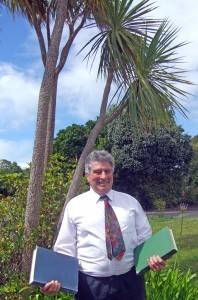 The first response to your question is to say that I don’t think there have been any great evolutionary steps in Anthropology over the last thirty years. In fact there has been a kind of classicisation of the subject over the period.
The first response to your question is to say that I don’t think there have been any great evolutionary steps in Anthropology over the last thirty years. In fact there has been a kind of classicisation of the subject over the period.
People still read Geertz on the cockfight, Levi Strauss on structuralism, the Sapir Whorf hypothesis and other things from a bag of tricks that has stayed very similar over a long period.
Like a lot of people from the Sixties I wanted to take things ‘back to the people’. So for me it was a matter of working for the people that I had studied and most of my life has been spent working for iwi in New Zealand. This is very, very unusual and lonely. The Maori field, if so it be called, has been a bit of a closed shop to outsiders, including anthropologists, these last thirty or forty years. Those that do come in do not usually stay.
So there is a fair way from what I do to what Anthropology does and has been doing these last thirty or so years.
Part of Anthropology is about small-scale societies and in some respects this makes the big picture of human survival outside scope. There is, of course, the idea that you can see the whole world in a grain of sand, that if you know the small-scale society then you will have something to say to the world.
I don’t know about this. Sometimes you manage to grasp the general in the specific and I leave it others to see where I might have done that in my work.
On a personal level, what aspects of your career have you found most gratifying? Are there achievements or simply memories of which you feel particularly fond?
The set of books that have been published in the last five years or so by me are a kind of statement or testament to my work. I’ve written a lot and I have dug deep into my past achievements and failures and also extended my interest and tried to connect with new things.
Personally, being employed by tribes gives me satisfaction in that I know, or think I know, that what I am doing cannot be too far off the mark.
You have a deep appreciation of the Performing Arts. How did you become involved in drama, music and dance, and how have these timeless art forms enriched you and your body of work?
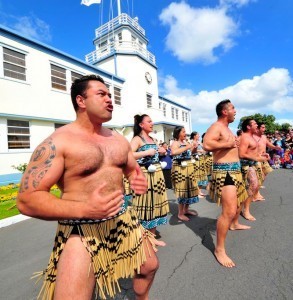 At high school I performed in plays and played the guitar. In between Bachelors and Masters I had a little theater company and I made a conscious decision at the age of 23 to stop working as a performer and become an academic. I found essay writing, especially thesis writing, attractive.
At high school I performed in plays and played the guitar. In between Bachelors and Masters I had a little theater company and I made a conscious decision at the age of 23 to stop working as a performer and become an academic. I found essay writing, especially thesis writing, attractive.
So the Performing Arts became a second string for me, one that every so often, looking back over my CV, comes through and becomes the main thing.
For example, not long ago some guy heard me play and sing at the Palmerston North City Library and gave me a gig. For over a year, I played the guitar and sang three times a week. When the London closed, I just put all that back into the second line and, who knows, maybe it will pop up again in the first line at some point in the future.
The writing on dance in the last few years shows a combination of the Anthropology and Performing Arts interests.
You recently reviewed my ballet-themed novel You, Fascinating You. Having little prior knowledge of the book’s historical context and coming from a vastly different cultural milieu, you nonetheless connected with the story and its characters. What makes a book—or any artistic expression—universal? To what extent can an artist transcend culture?
Transcendence of culture is not easy and in fact I’d say it’s a matter of attention to detail. Universality on the part of the author of a book is something that shines through the book itself, its reviews and its transmutations into, say, a film or an audio presentation.
In the case of You, Fascinating You, I kept notes about anything that I did not understand or have direct experience of. At the same time I tried to work out what I liked. The first exercise was defensive in that I did not want to make mistakes about someone else’s work and the second was a matter of personal inventory. Most good reviews of literature are to do with careful reading and reflection that deepens and intensifies that care.
What is next for Peter Cleave? Is there anything more you would like to share?
The main thing for me is not to get into a hamster situation where you run along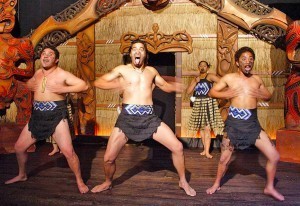 inside someone else’s trap, in someone else’s wheel or machine. Worse than this for me is to find myself in a trap of my own making.
inside someone else’s trap, in someone else’s wheel or machine. Worse than this for me is to find myself in a trap of my own making.
One good thing about being an anthropologist (but possibly a hamster trap) is that, if you have done the job half well over the years, then life seems good after fifty-five, as there are lots of students—even if there are just one or two passionate students, that is still good (at least it feels good)—who are following your work. At the same time, a healthy scepticism about your own propaganda is important.
For me, there are questions about how best to organize one’s life. For example it is all very well being ‘outside the machine’ or ‘under’ or ‘off the radar’ but one problem, I think it’s a problem, that I have is that I lock into a topic and stay there.
Talking to someone at my house for dinner the other night I used the word ‘defragmentation’. To this person I put the example of how, when working in a university, you would get to work, read your mail and then go down to the tea room. In the tea room you would find yourself talking to someone and on your return to your room you would think about that topic of conversation for a while and then it would be time for lunch and so time to go back to the tea room…
In that situation you were constantly defragging, taking things to bits and putting them back together again. Defragging, or whatever you might call this, was a major occupation and writing was something you did after hours, so to speak.
What happens to me in my situation of the last decade or more is that I write and write and write again. I know that I have to stop occasionally, so I jump on a plane and go to Inner Mongolia or the mountains of Sicily or he coast of Dalmatia. Or New Jersey. Anywhere to just stop, ride my bicycle in the open air or take a train. All this in order to draw breath before writing again.
So, planning how best to organize this without it becoming my own hamster trap is something I want to do next.
—
Peter continues his interview on video:
Peter’s Video Review of You, Fascinating You

Germaine Shames' Blog
- Germaine Shames's profile
- 10 followers


